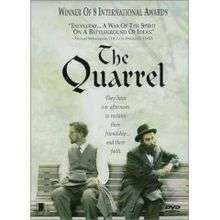The Quarrel
| The Quarrel | |
|---|---|
 | |
| Directed by | Eli Cohen |
| Produced by | David Brandes |
| Written by | Chaim Grade, David Brandes and Joseph Telushkin |
| Starring |
Saul Rubinek R. H. Thomson |
| Music by | William Goldstein |
| Cinematography | John Berrie |
| Edited by | Havelock Gradidge |
Release dates |
|
Running time | 85 minutes |
| Country | Canada |
| Language | English |
The Quarrel is a 1991 Canadian film directed by Eli Cohen, Saul Rubinek and R. H. Thomson. The film was written by David Brandes and Joseph Telushkin.
Plot
Two estranged friends – one a rabbi, and the other, an agnostic writer— are compelled to resume an argument that caused a separation between the pair many years earlier, after a chance meeting pushes the duo together once more. The Quarrel is a touching film that trails writer Chaim and his friend from youth, Rabbi Hersh, during their journey in a scenic park in Montreal as they return to an old argument regarding God and ethics; one that has newfound importance following the Holocaust that occurred since their last contact.
A chance encounter on the Jewish New Year offers Chaim and Hersh a final opportunity to face the past, clarify their conduct, and attempt to understand the vastly dissimilar lives they’ve led. On the forenoon of Rosh Hashana, Chaim gets bacon and eggs for his first meal of the day and receives a telephone call from the lady he casually slept with the previous night, whereas Hersh is down by the lakefront guiding his yeshiva scholars in prayer. Their way of life and beliefs could not differ any further, however boyhood friendships many times will develop beyond rationality. While the two gentlemen reveal their Holocaust incidents and describe how the lives they lead have strengthened their viewpoints, ‘the quarrel’ that develops turns into a battle to determine whether they are best friends or angry foes. But rather than boiling things down to a straightforward right-or-wrong reality, The Quarrel fleshes out their opposing perspectives and then lets them stew unsettled, acknowledging life’s complexities.
For the two Holocaust survivors, discussing God awakens intense sentiments. To the rabbi, Hersh, the Holocaust demonstrated that assimilation is not possible and inappropriate, and he has since devoted his days to his yeshiva and to strengthening the Jewish faith amongst God’s chosen people. Conversely, Chaim cannot resolve the promise that Jews are God’s chosen people with the atrocious murder of six million innocents. He thinks that if God exists, He broke his covenant with the Jewish people at Auschwitz concentration camp.
Opposed to supporting either man’s view, the exceptional discourse captures an impartial look at both religious and secular thought to portray the most compelling arguments for both, as the two friends continue their long-inactive dispute. Hersh maintains that his religious beliefs were only reinforced by the Holocaust, and that the abandonment of Judaism would be an offense to every Jew that died. He contends that without religious conviction man would be ruled by reason, the same “reason” that permitted individuals to ignore the killing of their Jewish neighbors. Chaim, in contrast, answers that faith in God doesn’t automatically make citizens behave ethically and that nonbelievers are able to be the most honorable of all. He reasons that belief in humanity and a love for mankind are what compel us to perform virtuous actions.
A mutual characteristic the two men share is rage; Chaim reveals that he lost his wife and sons, while Hersh divulges that he too lost his relatives in warfare and is the only surviving member of his family. The tremendous agony they have suffered has left a rage fuming within both of them, which reaches their exteriors and manifests as harshness.
Overall, The Quarrel takes an intimate view of friendship in attempting to understand what links two individuals. It is not only a common event or like way of thinking that connects humans. It is an enthusiasm and force that cannot be simply identified. Friends do not always see eye-to-eye. Hostility can originate from intense concern and sincere interest in what is best for the other person. Guests may be compelled to grin and nod, but someone who cares for you is not afraid to disagree.
Theatrical adaptation
Citing the authors’ long-held belief that the screenplay would adapt well to the live stage, Brandes completed revisions in 1999 and The Quarrel premiered in February, 1999 at The Playwrights Theatre of New Jersey, a theatre dedicated to nurturing new work. The play, featuring three actors Sam Guncler as Chaim, Reuven Russell as Hersh, and Philip Alberti as Joshua, and directed by Susan Fenichell, was critically acclaimed and its initial run extended to accommodate demand. The theatre also revised its performance schedule to accommodate the Jewish Sabbath in deference to Russell's observance. Avi Billet took over the role of Joshua for a number of performances in different venues after the production's New Jersey closing. Russell and Guncler returned in September, 2008 to star in the off-Broadway premiere of The Quarrel, with Federico Trigo as Joshua. The play was newly directed by Robert Walden and produced at the DR2 Theatre by Gallant Arts, in association with Matt Okin and Melanie Sylvan. Since closing in New York City, the production continues to tour the United States.
Notes
See also
References
- "The Quarrel - Movie - Review". The New York Times. November 1992. Retrieved August 25, 2008.
External links
- The Quarrel at the Internet Movie Database
- The Quarrel - movie website by the producer
- The Jewish Channel
- The Quarrel live touring production